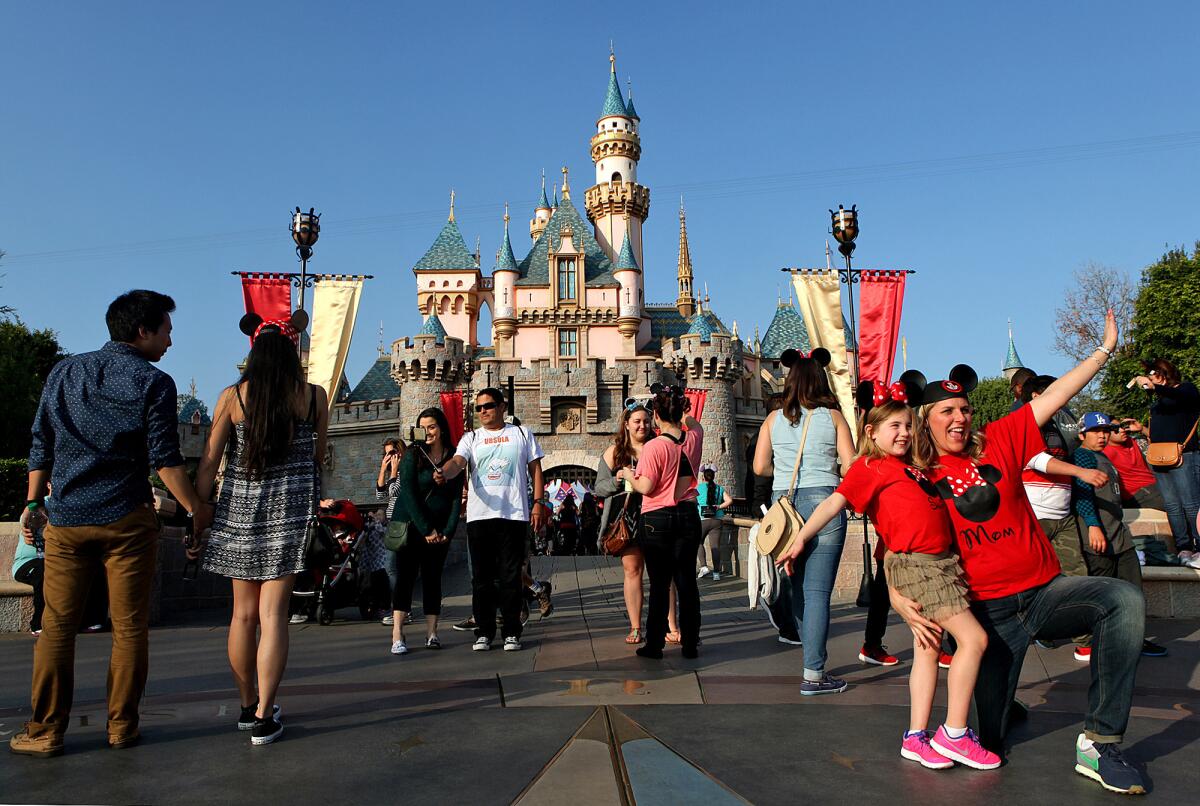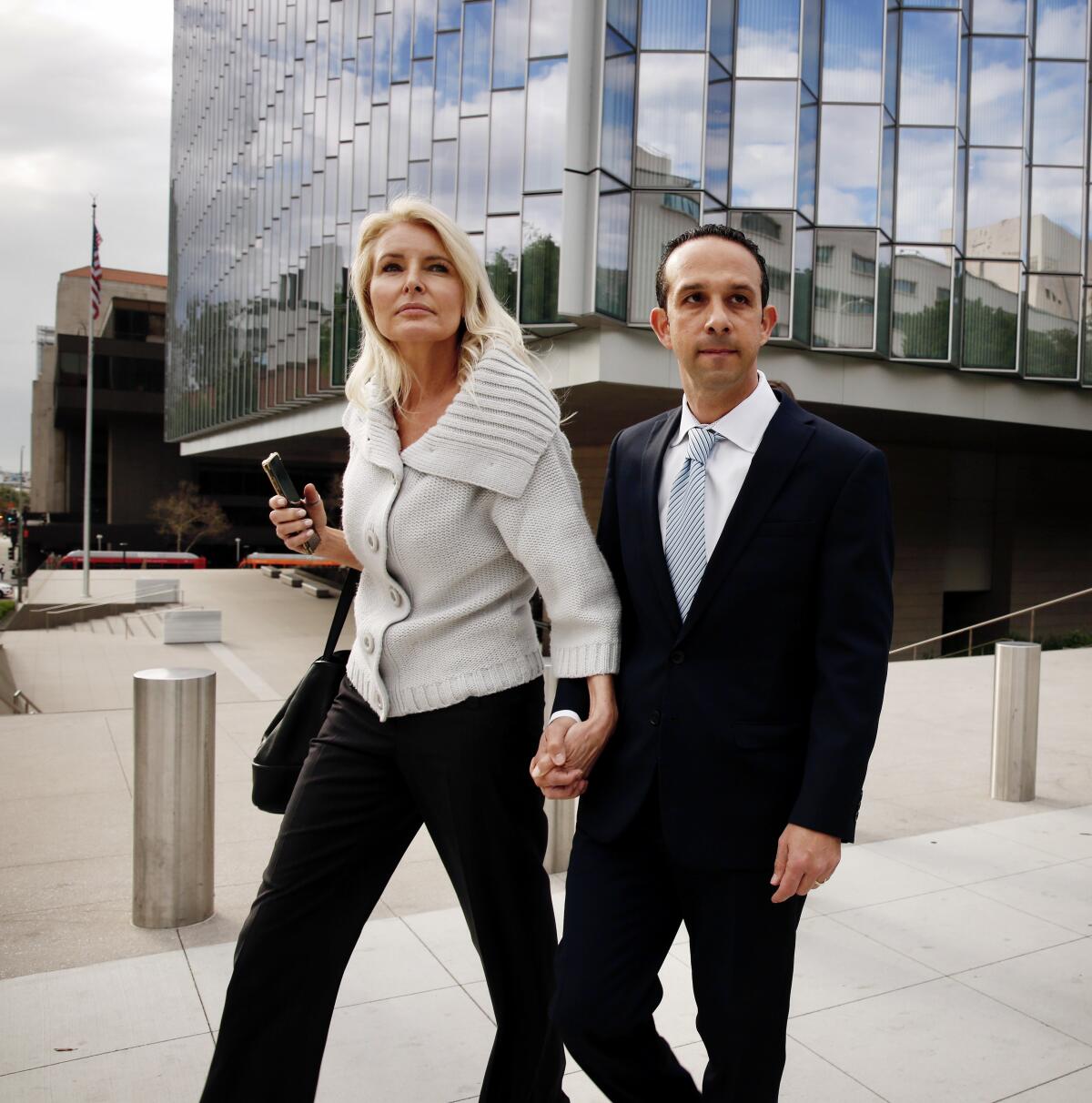Newsletter: Life as we know it suspended indefinitely

- Share via
Good morning, and welcome to the Essential California newsletter. It’s Friday, March 13, and I’m writing from Los Angeles.
Since opening its gates in 1955, Disneyland has suspended operations only three times in the past: for a national day of mourning after President John F. Kennedy’s assassination, after the 1994 Northridge earthquake and in the wake of the Sept. 11 attacks. The world’s most famous amusement park is more than just an international symbol of the Southern California good life — it also generates $8.5 billion in economic activity each year for the Southern California economy and is responsible for 78,000 jobs, mostly in Orange County.
For the record:
11:02 a.m. March 13, 2020For the record: Yesterday’s edition said that Disneyland has operated seven days a week since opening in 1955. It has only operated seven days a week year-round since the 1980s.
But on Saturday morning, Disneyland and Disney California Adventure will close their gates through the end of the month in response to the coronavirus.
[Read the story: “Disneyland and Universal Studios to close for the rest of the month because of coronavirus” in the Los Angeles Times]
News of more suspensions and closures came hard and fast Thursday. The National Hockey League and Major League Soccer suspended their seasons indefinitely; Major League Baseball is suspending spring training indefinitely. The NCAA has canceled March Madness. Live Nation and AEG, the two live entertainment promotion firms that overwhelmingly dominate the global concert industry, have suspended all touring activities. The San Francisco Unified School District is closing all schools for three weeks, beginning Monday through the end of the regularly scheduled spring break April 3.
All of this comes a day after Gov. Gavin Newsom called for the cancellation of gatherings of 250 or more people through the end of March, marking the first time he has applied so-called social distancing practices to the entire state of California. On Thursday, he released a sweeping executive order that allows the state to commandeer hotels and medical facilities to treat coronavirus patients and permits government officials to hold teleconferences in private without violating open meeting laws.
The long and short of it? Life as we know it has been indefinitely suspended.
Emergency room physicians nationwide are preparing for a surge in patients infected with the novel coronavirus, and the number of known cases is likely to explode in the coming weeks as testing increases.
But, as my colleagues Soumya Karlamangla and Emily Baumgaertner write, testing for the virus continues to face severe limitations, as California health officials lack key components to conduct laboratory analysis, marking another barrier in the state’s efforts to identify infectious patients.
[Read the story: “Problems mount with coronavirus testing, limiting access and sowing confusion” in the Los Angeles Times]
And the financial markets plunged deeply Thursday, notching their worst day of trading since the 1987 crash and furthering fears of the economic difficulties to come. House Democrats and the White House are said to be close to a deal on an economic stimulus package to address the widening impact of the coronavirus on American workers and businesses.
The rippling effects of the pandemic are only just beginning to play out in California workplaces, with many white-collar workers already being given the option to self-quarantine from home. But, as my colleague Suhauna Hussain writes, “many workers — typically low-wage blue-collar workers — will be asked to continue to show up to work as usual. Still others will lose work and wages as events are canceled and operations halted because of the viral outbreak. And a few will be asked to carry the weight of the heightened safety measures enacted to protect the many.”
For Californians wondering about their own options, Suhauna has put together an excellent explainer on what labor lawyers, state officials and government agencies say could unfold in the workplace, and the rights workers have in California.
[Read the story: “Coronavirus and labor law: Know your rights, from paid sick leave to working from home” in the Los Angeles Times]
Despite how it might feel, the world is not ending. Yes, we are entering an unprecedented period of disruption. And yes, there will be great difficulty. But there will also be an after.
The only certainty here is that no matter what happens, there will be an after. We all play a role in determining what our communities look like between then and now.
Social distancing measures will be crucial to “flattening the curve” and slowing down the rate of infections so that our healthcare system isn’t overwhelmed with patients.
My colleague Matt Pearce wrote that he imagined all the closures and cancellations were giving people “a sense of ominousness.” But, he continued, “it’s really an amazing act of social solidarity: We’re sacrificing so we can give nurses, doctors and hospitals a fighting chance. Start from there and hopefully we can figure out the rest.”
If you haven’t already started to take this seriously, now is the time. Not for panic, but for solidarity.
We all share space in the world. And that world — fragile and imperfect as it is — remains a place governed by an unwritten social contract to take care of each other. Please wash your hands. Please take precautions and follow the social distancing guidelines. Every other person on the sidewalk also has desperately loved elderly and immunocompromised friends and family members, or is themselves at greater risk for those same reasons.
It’s easy to feel like nothing matters amid so much uncertainty. But those small things matter now more than ever.
Here’s what else you need to know about the coronavirus outbreak, in California and beyond:
- Coronavirus cases continued to mount across California, as counties both big and small reported new tallies on Thursday. Los Angeles Times
- Should L.A. Unified close schools to half a million students? The coronavirus debate rages. Los Angeles Times
- A senior Brazilian official who attended weekend events with President Trump in Florida has tested positive for the coronavirus, marking the first time that someone known to have the virus was physically close to the president. Trump does not plan to be tested or go into self-quarantine, the White House said. Los Angeles Times
- Can Tom Hanks and the NBA stop coronavirus skepticism in boomers and others? Public health officials say it’s been difficult to persuade older generations to comply with precautions as many of them resist such drastic measures. Los Angeles Times
- Has the spread of COVID-19 affected your work or employer? We want to hear from you. Tell us about your experiences here.
Sign up for Coronavirus Today, a new special edition of the Los Angeles Times’ Health and Science newsletter that will help you understand more about COVID-19.
And now, here’s what’s happening across California:
L.A. STORIES
“It’s like a movie!” A tightknit corner of the San Fernando Valley has been rocked by the indictment of former L.A. City Councilman Mitch Englander. Englander was charged Monday with obstructing a federal investigation into cash, lavish meals, escort services and other gifts that officials say he accepted from a businessman during trips. Los Angeles Times

Enjoying this newsletter?
Subscribe to the Los Angeles Times.
POLITICS AND GOVERNMENT
Children faced “incredible pain and suffering” when a Madera County social worker intentionally discarded hundreds of child abuse reports last year, according to government emails uncovered in a Fresno Bee investigation. Fresno Bee
CRIME AND COURTS
Former Rep. Duncan Hunter’s attorneys are seeking home confinement instead of federal prison for the nearly six-term Republican congressman. Hunter and his wife and former campaign manager face sentencing Tuesday after being accused in a sweeping 2018 indictment of misusing more than $250,000 in campaign contributions. Both Hunters pleaded guilty to a single conspiracy count in plea agreements last year. Los Angeles Times
HEALTH AND THE ENVIRONMENT
Days of rain are on tap for Southern California after a mostly dry start to the year. Los Angeles Times
CALIFORNIA CULTURE
“When the world feels scary, I want to garden.” Here’s what to plant right now. Los Angeles Times
California’s oldest home is a cedar cabin built in 1801. The cabin, which is in the Southern California mountains, is listed for $635,000. SF Gate
CALIFORNIA ALMANAC
Los Angeles: rain, 61. San Diego: rain, 63. San Francisco: windy, 61. San Jose: sunny, 67. Fresno: sunny, 74. Sacramento: sunny, 72. More weather is here.
AND FINALLY
“In the dark times / Will there also be singing? Yes, there will also be singing / About the dark times.”
— - Bertolt Brecht
If you have a memory or story about the Golden State, share it with us. (Please keep your story to 100 words.)
Please let us know what we can do to make this newsletter more useful to you. Send comments, complaints, ideas and unrelated book recommendations to Julia Wick. Follow her on Twitter @Sherlyholmes.
Sign up for Essential California
The most important California stories and recommendations in your inbox every morning.
You may occasionally receive promotional content from the Los Angeles Times.







